| |
"He that troubleth his own house shall inherit the wind: and the fool shall be servant to the wise of heart." |
| |
Proverbs, 11:29, King James Bible |
| |
"For with a dramatic face-off between Spencer Tracy and Fredric March, the two unsurpassable actors persuaded to play the roles, Mr. Kramer has wonderfully accomplished not only a graphic flesh- ing of his theme but he also has got one of the most brilliant and engrossing displays of acting ever witnessed on the screen." |
| |
Review, New York Times, October 13th 1960* |
Personal Note: Our regular visitors are well aware that both Slarek and myself often comment from our individual perspectives prompted by our reactions to the movies we are reviewing. I have in mind a digression from the actual review that if presented up front, you'd think I'd gone insane ("Where's the bloody review?") but I feel there are things that need saying prompted by this wonderful film and now's the time. Now is always the time. You could say I got a sign off The Times so for the curious among you, I'll direct you to this accompanying article where you will find my short soapbox deliberations of the day eked out by ideas expressed in Inherit The Wind... For the readers and purveyors of news (and not that fake stuff, a concept that has done more damage to democracy than most of us can conceive) I will say as a clue, 'lingerie' and hold my thoughts until the appreciation of a genuine classic has been given.
To his credit, Slarek let me loose on this one, another humanistic gem from Stanley Kramer, a film well loved by both of us. To anyone that knows us personally, the subject matter of Inherit The Wind should offer up a nice, cowering straw dog, a simplistic target, a critical slam-dunk to be sure. It's science versus religion folks... Roll up! Roll up! See the giant of reason squash the ant of superstition... To score points is, I hope in this review, not the point nor desirable. I am going to try my very hardest to avoid defending science against... (oh boy, this is already difficult) a belief in the supernatural. Believe it or not, a play and subsequent film about a young teacher who is pilloried in his own Tennessee community for daring to teach evolution is not strictly about the clash of the proven with that taken on faith. Kramer's film was always meant as a metaphor for McCarthyism and how that poisonous period of American history did nothing but deliver distrust and encourage a section of an already quietly xenophobic populace to indulge in its most righteous, divisive and anti-human behaviour the US had seen up to that point. Gee, sound familiar? This is precisely why some timeless movies have relevance in whatever century as long as the human animal armed with its steadfast and impregnable ignorance still walks the Earth.
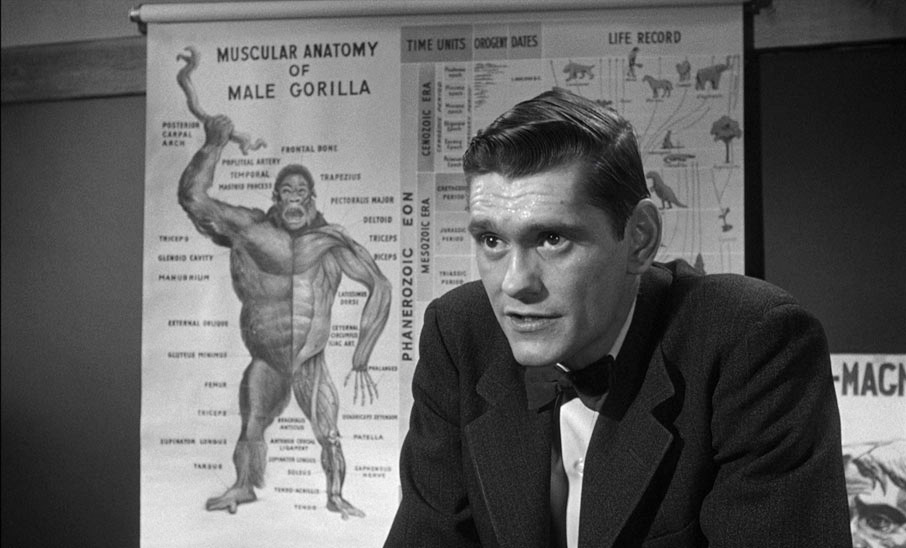
Inherit The Wind starts with, to all intents and purposes, sinister 'men in grey' meeting up with a small town preacher. They enter a school and in the middle of a lesson, arrest the teacher on the charge of teaching his pupils to think for themselves, specifically promoting evolution thereby downgrading biblical creationism as the ridiculous, unimaginative fantasy that it surely is – a fantasy believed by everybody else in the hereabouts. This is a town, as we are continually reminded, full of simple folk (they got that right – sorry, sorry) who want no truck with the city and the scientific wisdom that has come to light, evidence that is casting a profound shadow of doubt over the validity of religious doctrine and its purported biblical 'facts'. Promoting the conflict between church and science is a cynical but progressive journalist who engages a respected lawyer to fight the teacher's case against a zealous, faith-fuelled statesman who seems to have been based on Billy Graham, the Southern Baptist minister as close to a rock star Christianity could ever boast.
The movie is essentially two men with two polarised points of view, one based on scientific evidence, the other Bible-based faith and how they steer a path towards a somewhat unforeseen conclusion. As a courtroom drama, this one's a real winner. I remember seeing the film at a young age and being stunned that people simply couldn't accept facts. Surely that's how we move forward as civilised societies. I'm even more dumbfounded now. I have the image of a miffed Professor Brian Cox with a stack of verified evidence of climate change in front of him and a stubborn and idiotic politician refusing to acknowledge it, spouting semantics in the face of a tsunami of facts. Cox used the word 'consensus' trying to indicate that the majority of scientists now accept human culpability in global warming because of the evidence. The politician's answer was that the word 'consensus' was not scientific. With respect to Ms. Swift, deniers gonna deny. As Cox has amply displayed on the superb BBC Radio 4 programme The Infinite Monkey Cage, he has no time for credulous fools who support the validity of unscientific claptrap. Well, he would say that. He's a Pisces.
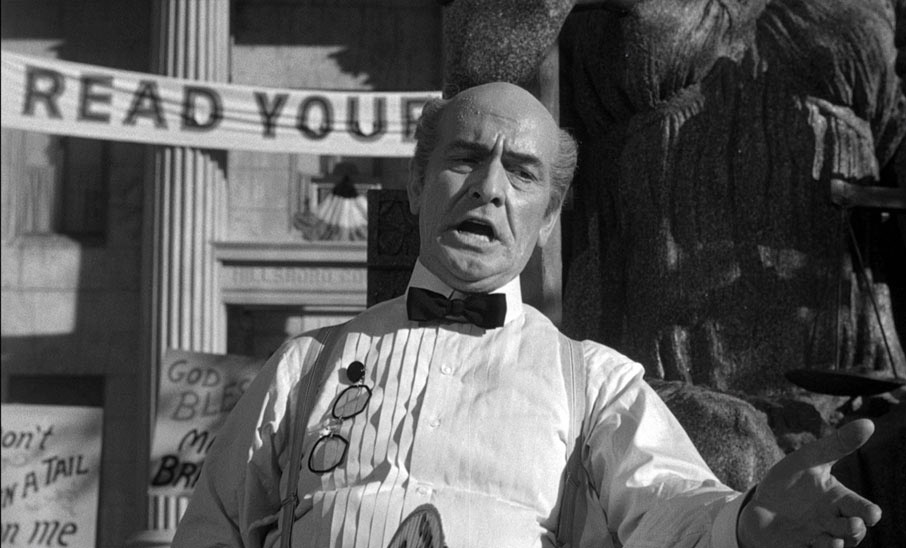
If you believe that the Bible is the word of the creator of the universe then you are, by definition, intellectually compromised. That shouldn't be a loaded or rude statement but I am acutely aware it's both. I have no intentions of malice or ill will toward anyone in saying it either. I'm not against people at all. I am critical of what seem to be really bad ideas and most religions seem to have a surfeit. Well, what do you expect from holy books written in the infancy of our species, books that endorse slavery and the appalling treatment of women as just another fine day in God's good garden? Ireland votes on repealing the abortion amendment a week from writing these words. Whichever way it goes, it's going to be close. The overreaching affect of religious lore and ancient traditions still poisons human society in the age of sophisticated primates accurately placing hardware one hundred and forty million miles away on Mars (just think about that for a moment), driverless cars and the Large Hadron Collider. Even God wrangled her way in there too. There is simply too much evidence to suggest that holy books were written by men to deliver allegory, morality and symbolism in an effort to use ideas to unite warring tribes. As a work of literature, the Bible is eminently noteworthy. You don't get much better than the Golden Rule as a slice of confident and strident morality. And the general tone of Bill and Ted's 'Be excellent to each other' in the New Testament is affirming as long as you carefully cherry pick. Because we have been brought up to do so, some people derive great succour from their sacred texts and that's fine. We are all free to believe what we like and get support from wherever we find it. But facts are facts. What if someone's adherence to Scripture and their subsequent denial of facts are shored up by a whole town full of like-minded souls? If a lone voice whispers that one and one is two in the middle of a dense crowd of ten thousand who chant back "It most certainly isn't and how dare you say it is. Get you to a jail cell," then the truth sits at the back of the battle bus, cowed and wary. Too many aspects of our society let truth slough off like dead skin and allow spurious opinions to sway public discourse. It's happening today more and more with arch-fantasist Donald Trump leading the credulous train. In a philosophical mood, you may well ask "Ah, but what is truth?" My answer would be "I don't know but science does and we are learning new truths from evidence every day." And if I have to hear Give Me That Old Time Religion once more I'll scream. It's played to death as Prosecutor Brady rides into town like an all-conquering hero and as an ear-worm, the tune is almost unassailable. Its only rival for looping maximum brain irritation is From Now On from The Greatest Showman, a song that can accompany me and my thoughts for the forty-five minutes it takes for me to walk my dogs. Heavens, I digress.
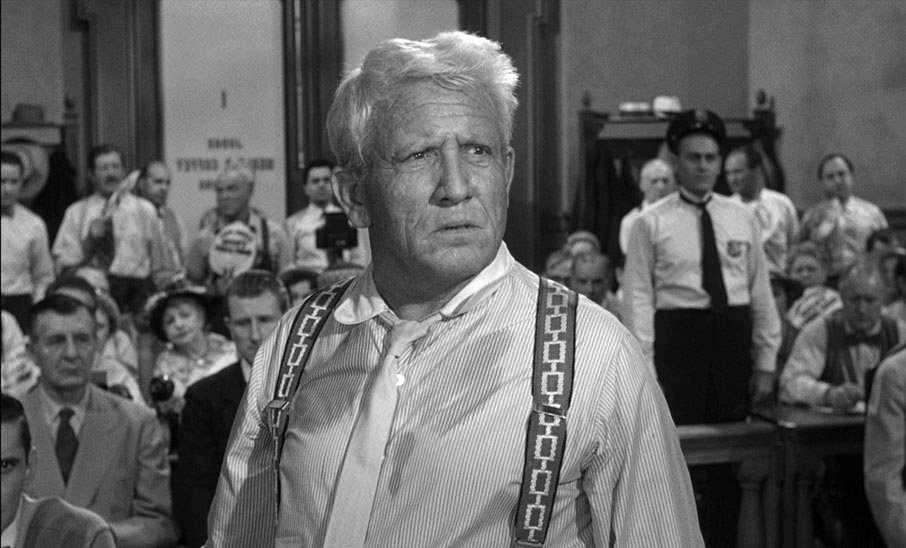
There is a supposition out in culture-world that suggests that The Texas Chainsaw Massacre shares its principal inspiration with Psycho. Both disclosed an acknowledgement of the life and murderous times of a Mr. Ed Gein. But as movies take liberties with the truth, it's fair to say that if Mr. Gein was the actual inspiration, The Texas Chainsaw Massacre actually took place in Wisconsin, the murder weapon was a twenty-two-calibre rifle and the massacre? A steady blood-drip feed of a few poor women who came into casual and calamitous contact with this monster not to mention (which I am clearly doing) the many cadavers whose graves he raided from. It's the same with Inherit The Wind. Based on a true story, (Google 'Scopes trial') it takes so many liberties with said truth that it's hard not to be faintly sympathetic with those shown in such broad strokes to be (ahem) credulous morons. If Kramer had each of the townsfolk wear T-shirts bearing the words 'I'm a credulous moron' it couldn't be as critical as it already is. In fact Kramer does that in so many words, having groups of them protest the existence of an atheist in their midst with placards and a burning effigy. One placard reads 'You Can't Make Monkeys Out Of Us', an irony so gobsmacking it sends you scurrying for a DNA kit and a stiff drink. I have never really understood this furious and sustained attack upon atheism, which is so rife in the US (or so it is reported). Living a life based on reason and science seems so fundamental to well-being but then I've never embraced Jesus. This is not because I have issues with righteous hippies who meant well two millennia ago – if he existed at all. It's mostly because he's dead (a fact that has been in some dispute, once upon a time). Now, this is from the point of view of a person who has no relationship with superstition at all. That we need a word for 'atheism' still makes me scratch my head. Perhaps the religious amongst you will sympathise with these people who give mob rule a bad name. But atheist or believer alike, I think by 2018's general standards of behaviour, (Jesus! Whom am I kidding?) both would find the townsfolk of Hillsboro cartoonlike in their staunch belief and cement-strong dogma. This is blinkered faith made parody but for all I know it could be a documentary-like depiction. I wasn't around in the 1920s in small town middle America. This two-dimensional mob in turn forces the real dramatic weight of the film to be thrust on to the shoulders of the counsel for the defence and prosecution. And both do not disappoint.
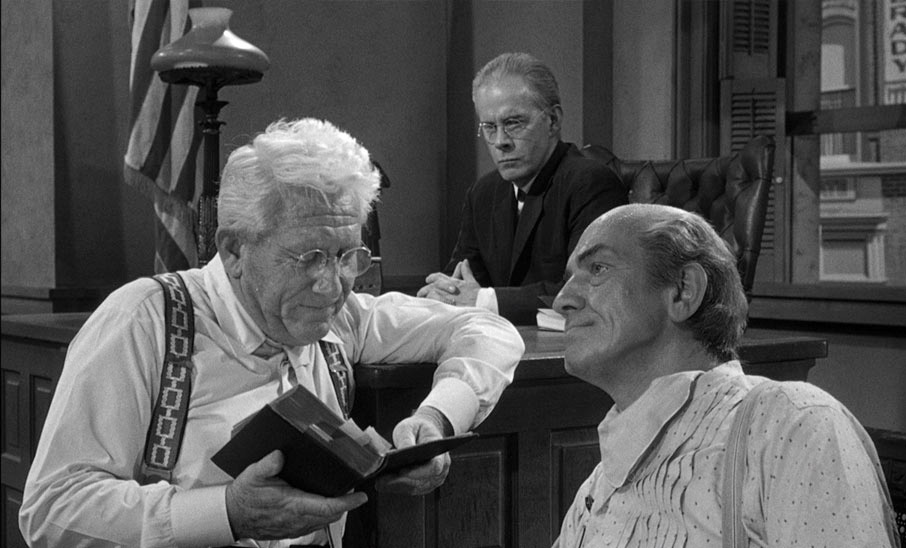
Spencer Tracy (playing Henry Drummond, the defence lawyer) has learned gravitas at his fingertips. His earnest and world-weary countenance makes him perfect for the role of the harried atheist in a God-fearing town. Tracy was an intelligent and idiosyncratic actor. He was never really typecast in his career and earnestness snuck up on him in middle and later age. I have fond memories of almost every Tracy performance I've seen. I am especially a fan of his one-armed Macreedy in the superlative Bad Day At Black Rock. Now there's one for Eureka's future slate. His opponent, Fredric March, has the ramrod certainty of a man of faith who will not entertain scientific fact much less yield to it. His portrayal of Matthew Harrison Brady is one of a smug blow-hard, deeply versed in his Bible and so inured against reason that it doesn't take long for the audience to see what a deeply emotionally flawed man he is. It's simultaneously both a great and terrible role. March sinks his teeth into Brady with zeal, his theatrical acting style clashing with Tracy's relative restraint is a deliberate choice, one assumes, made by Kramer. But as Harrison, he is about as sympathetic as a tired scarecrow. He has a distinctive, default pout which underlines his stubbornness. Both actors are at the top of their game and it's a joy to behold. It's a small pity that the superior picture quality makes spotting the bald wig on March a little too easy. Take a look at 1 hour, 49 mins and 54 seconds. It's subtle but the make up line is visible. This takes nothing away from the performance. March is extraordinarily convinced of his faith and lets no reasoned argument or point of fact pierce that dense layer of godliness. And oh boy, dense is the word.
The rest of the cast acquit themselves very well but among them, it's Gene Kelly as Hornbeck, the contemptuous journalist who shines. "I may be rancid butter," he says. "But I'm on your side of the bread." Well, quite. Yes, he represents my point of view (I don't think I'm that cynical) but it's so nice to see Kelly in a film that must have meant something to him politically. He had been married to a blacklisted actress (Betsy Blair, the subject of Ernest Borgnine's attentions in Marty) and was on the 'grey list' himself for his humanistic socialism. He is a first class example of how charm can effortlessly mutate into smarm at the flick of a twitch. His remark after a tragedy in the film earns him a rebuke from Tracy and their subsequent final scene confrontation is an outstanding golden nugget in a mine full of them.
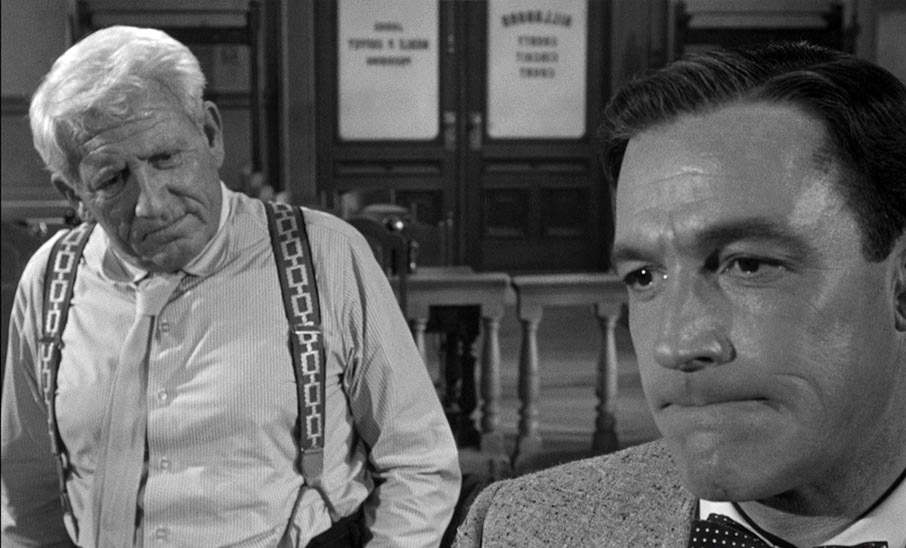
In the foreground right, Kelly stands while in the background left Tracy upbraids him for his cynicism, piling in to him, and Kelly shows us beautifully that the words do indeed hit home. His eyes well up and after a few seconds, the reporter returns to Earth with a zinger for Tracy to end on. It's always fun recognising actors who popped up in one's childhood. Dick York, a regular on my TV as Samantha's oblivious husband in Bewitched, plays the teacher Cates whose arrest causes all the fuss. Typecast heavy Claude Akins plays the preacher. You get the impression that Kramer knew exactly what he was doing casting a 'bad guy' as the epitome of religious goodness, the wily fox.
As its theatrical roots suggest, this is not a camera-swooping action spectacle. This is a word-based drama directed and shot with restraint and old-fashioned Hollywood professionalism. Kramer has never claimed to possess 'a personal style' and therefore never features high on 'best of' lists but then there is a theory (one I just made up) to suggest that as each film is a prototype, a single directorial style (in the same sense of an editorial or writing style) may be injurious to the project at hand. But it is a personal style that many critics thrust forward as an indicator of directorial greatness. That said, a gleeful, chaotic part of my psyche would pay money to see My Dinner With Andre directed by Michael Bay. Andrew Sarris, the influential American critic who is credited with bringing the absurd 'auteur' theory over the Atlantic from France published a book that still has some weight in the older critical community even though it lists no films after 1968. The American Cinema (1968, naturally) rates directors in what sometimes seem like ad-libbed categories ('Pantheon', 'Less Than Meets The Eye', 'Strained Seriousness' etc.) Kramer ends up in 'Miscellany' (ouch) and about him Sarris has this to say; "...his very ineptness has been encrusted with tradition," (double ouch) and "He will never be a natural but time has proved that he is not a fake." So not a fan then despite noting his authenticity. Steven Spielberg is far more appreciative. "He is one of our great filmmakers, not just for the art and passion he put on-screen, but for the impact he has made on the conscience of the world." I'll go with Spielberg. Thank you, Stanley.
I cannot tell you how pleasurable it is to see an old, beloved classic looking like it spent hours in front of the mirror getting ready for its Eureka Classics Blu-ray debut. Presented in the 1.66:1 pillar-boxed aspect ratio (with narrow black bars either side to fit on a standard 16x9 TV), its black and white photography is crisply rendered. It looks sumptuous, particularly in scenes exposed out in the sun. Pin sharp, the contrast is pleasing with a fine range and detail maintained at both ends of the spectrum. In short, it's a beautiful transfer.
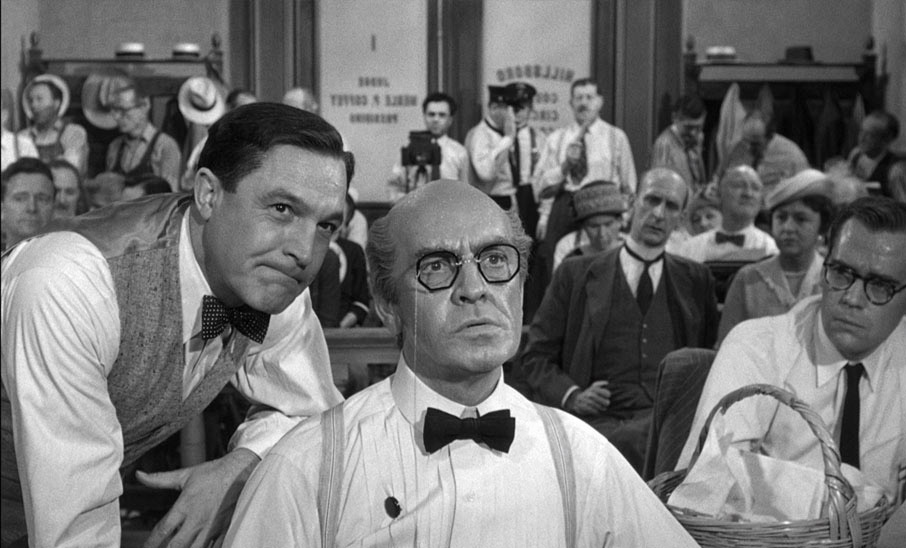
Every word (even the one in the beginning) of the original mono soundtrack - rendered in stereo channels - is clear as a church bell. As ever, there are optional English subtitles for the deaf and hard-of-hearing.
A new video interview with film scholar Neil Sinyard (24' 48")
Sinyard either has an off-screen teleprompter or a prodigious cine-literate mind that can recall facts in the most impressive way. I'll go with the latter. We only cut away from a mid-shot of him when we need to see people and posters of films he's referencing. This is all the background you could wish to know about the film. In the first of two mysteries about this disc, a single letter 'S' forms the end credit of this extra, a placeholder I suspect on the review disc but I do love little mysteries. Why an 'S'? What on Earth is wrong with a 'P' for 'placeholder'? Or indeed, the word 'placeholder'? For the second mystery, see my section on the booklet.
Original theatrical trailer (4' 06")
Director Kramer, with another controversial subject, introduces clips from the film. This is less of a trailer and more of a "Look, the subject's tricky but cineastes have liked it – we've won awards already..." The overly dramatic music over two older men arguing in court bulldozes over the top by our standards today. You always get the slightly wary impression that if you need the director to front the trailer, someone's nervous somewhere in the marketing department. At the 1960 Berlin Film Festival, Kramer picked up a Silver Bear for the movie and curiously a 'Special Youth Award' voted by teenagers all over Germany. What? Kramer ends the trailer by promising great performances and that in the subject of Darwin versus God, we have to make up our own minds. OK. After seeing the film, we're fairly sure on which side of that fence Kramer is positioned although there are moments in the movie that play as a sop to the religious sensibility. It's a mite disingenuous after all we've been through to have Tracy seem to change tack in the last scene or at least to waver. That could be fear on Kramer's part. Given the Life of Brian type controversy the film stirred up on its release, I'm not surprised.
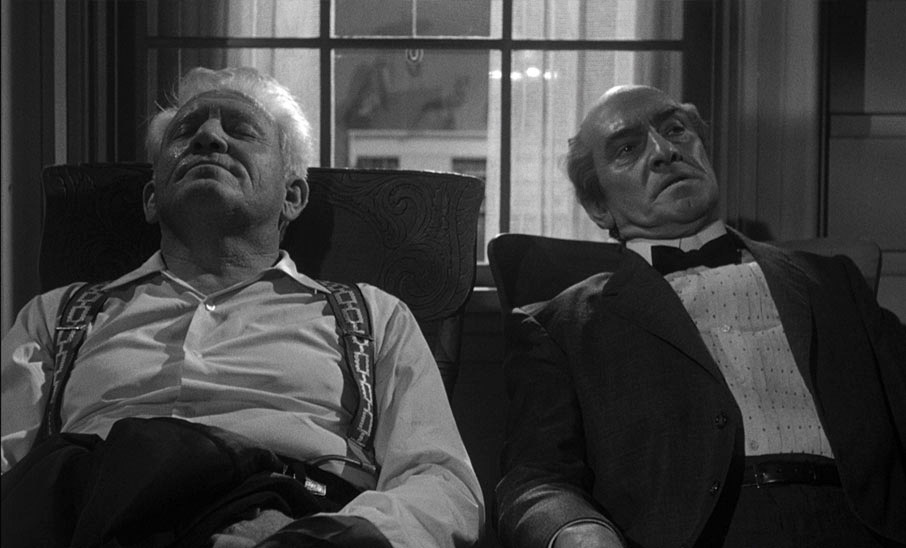
Limited Edition Collector's Booklet (First Pressing Only)
Another little gem from Eureka, more modest this time with just Viewing Notes, Disc Credits and one article, an extract from Kramer's autobiography highlighting his struggles with Inherit The Wind. I've just ordered the full tome. I really want to know how this man managed a successful career in Hollywood. It's a great read and the booklet is packed with classy black and white production stills. And so on to mystery number two. How does Mr. March actually spell his first name? I go to the front credit of the movie as I suspect someone checked before committing its spelling to an optical printer (but hey, mistakes are made there too). It says 'Fredric'. This ties in with the IMDb (but the Lord knows that this holy of holies is certainly not infallible. My own work is credited across a broad range of people who share my name with different numbers attached). Google slaps my hand if I insert the extra 'e' in 'Frederic'. Do you mean 'Fredric March'? But it is an easy mistake to make and I've made it more than once. The extra 'e' sneaks in on page two of the booklet (it's written on the booklet cover's poster without the 'e'). But no matter. Eureka is in good company. In the Kramer extract, he puts the extra 'e' in too...**
We've come a long way since the original trial. If only someone could kick start a meme of 'The Truth of Evolution'. If I ever hear anyone say to me again, "It's only a theory," I'll be profoundly unhappy and may misbehave. There could be tears. Inherit The Wind is a film that deals with what should now be an open and shut case. Darwin was right. Let's start phasing out old ideas that have no more relevance to us, especially those ideas that come with religion, those uniquely anti-human for some belief's sake. This is still an argument that rages across the world and it really shouldn't be. When I heard born again Christian George W. Bush espouse teaching both 'intelligent design' and evolution together, he placed two ideas at equal standing, the former a rampantly improbable religious claim of divine intervention and the latter a provably true account of all life on Earth. These are as equal in the ring as Mike Tyson and Quentin Crisp (no offence Quentin. I'm sure you have a mean right hook). They are not equal ideas, not even close. But what Inherit The Wind does for which I applaud it loudly, is put front and centre the accusation of the overwhelming arrogance of those who believe that God speaks to them directly. They can then speak confidently with His/Her/Its authority. WTFF? (third F, just add an 'ing'). Whenever I see a priest, I am always bowled over (probably as much as they believed they were by God) by the idea that a human being can profess to be in contact with the creator of the universe. Just think about that. No. Really let that sink in. It's even stranger when the priest's name is Kevin or something equally mundane. Hey, this is a summary! Let it go. Inherit The Wind is a tremendous courtroom drama about an important subject... free speech. But more on that in just a moment. Hugely and warmly recommended.
|